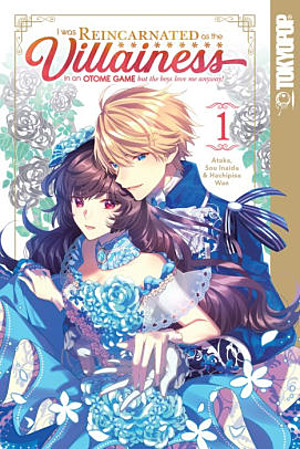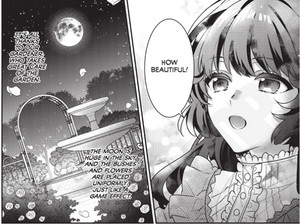The Spring 2021 Manga Guide
I Was Reincarnated as the Villainess in an Otome Game but the Boys Love Me Anyway!
What's It About?
 Mistia Erlaine is the daughter of a noble family who just started at high school. She's surrounded by a group of adoring classmates and her charming fiancé. Everything seems perfect.
Mistia Erlaine is the daughter of a noble family who just started at high school. She's surrounded by a group of adoring classmates and her charming fiancé. Everything seems perfect.Except that this world is actually a dating sim called “Kyun Love”, and she's destined to become the main character's evil rival! Mistia is determined to do everything she can to avoid her fate but it's not as easy as it sounds. Especially when all the boys keep falling in love with her!
I Was Reincarnated as the Villainess in an Otome Game but the Boys Love Me Anyway! is based on the light novel of the same name by Sou Inaida. The manga is drawn by Ataka and Tokyopop has released the print version of the first volume for $12.99
Is It Worth Reading?

Rebecca Silverman
Rating:
Could any book with such an unwieldy title be anything but a light novel adaptation? Even if it wasn't, there are a lot of similarities between this work and one featuring a certain villainess whose routes all lead to doom. Case in point: when a sixteen-year-old Japanese girl dies, she's reincarnated into the world of the otome game she was playing before her fateful encounter with Truck-kun, and to top things off, she's not the heroine but the villainess. Seeking to avoid a catastrophic bad end, young Mystia tries to avoid her engagement to a shining princely character, but somehow ends up making him fall for her instead. Ditto with the playboy love interest and her personal maid.
So yeah, there isn't a lot that's particularly innovative about this book, and it in many ways feels like a case of “if you've read one, you've read 'em all.” But that doesn't really detract from the enjoyment of the volume, and even if there are a lot of the same plot points and archetypes, the story has its own quirks that still makes it enjoyable, especially if you're a fan of the genre. Chief among those is something that comes up in the bonus chapter: the revelation that Mystia has always harbored the personality of her former life, she just didn't remember it until she turned ten. In many of this style of isekai stories, the main character maintains their original game personality until the moment something jogs their memories of their past lives, at which point they undergo a major change. But in the chapter from her parents' point of view, we learn that Mystia always had her Japanese personality, making this an alternate version of the game world rather than the game world as it existed before. Mystia has been kind and compassionate from the beginning, making her behavior once she regained her memories in line with everything she's done before. That suggests that even without them she would have been fine, and that it is in fact her past life memories that stand to gum things up rather than a predetermined storyline.
That said, the sheer number of people devoted to her may be a little much even for reverse harem fans. Yes, both of the love interests thus far introduced have feelings for her (and comfortably fit the Jeord and Keith roles, if you're keeping track, although Mystia's more of a Sophia than a Katarina), but all of the servants are also crazy about her in a variety of ways, and in fact vociferously object to her engagement to Raid because it would take her out of the Aren household. It feels like the real fantasy at play here is not getting all the hot guys but being universally loved, which, again, is just different enough (or played differently enough) that it sets this apart from its closest brethren, but it also feels more than a little ridiculous.
Despite that, there's just something endearing and enjoyable about the whole thing. It certainly helps that the art is pretty in a flowery way and filled with nice background details, but really, it's the plot and characters so wholeheartedly embracing the tropes that makes it work. It's certainly not reinventing the genre, but it works very nicely as comfort food.

Lynzee Loveridge
Rating:
With the success of My Next Life as a Villainess: All Routes Lead to Doom!, a smaller trend of "reincarnated as a villain" and "reincarnated in an otome game" isekai variants have emerged. Some are queer (I'm in Love with the Villainess), some involve the protagonist's own edgy fanfics (The Dark History of the Reincarnated Villainess), and others add a touch of comedy by making the reincarnation mediocre (The Weakest Manga Villainess Wants Her Freedom!). Almost all include some attempt to subvert fate in order to avoid a bad end, as seen in Tokyopop's release of I Was Reincarnated as the Villainess in an Otome Game but the Boys Love Me Anyway!
Unlike My Next Life as a Villainess, Mystia isn't a walking snack vacuum with a winning personality. She's more reserved and anxious but still manages to entice her share of suitors despite her own lack of awareness. She also isn't operating with all the answers; she'll get sparks of revelation about major events but is mostly trying to feel her way through scenarios without definite knowledge of what is going to happen. That doesn't stop her from fulfilling her heroine role of inadvertently winning over the guys around her.
There are a few things that hold this manga back from being a truly entertaining read; one part comes from the story itself and the other comes from the localization. As a story, I Was Reincarnated as the Villainess blows through its plot. The staging and pacing is a major problem as the story sort of throws you into the deep end of what's going on, gives a bit of backstory about the reincarnation via a flashback, and then jumps back again five years to when Mystia is 10. My Next Life as a Villainess had a similar approach, starting us off with the characters as children, which I don't personally find that interesting. The first major conflict is also dropped on the reader and solved just as quickly, as Mystia easily goads a potential murderer into revealing himself with little to no effort.
The translation here is really holding the book back, though. The English is very stilted and has a lot unnatural phrasing and word choice. The notorious "it can't be helped" is used several times along with "wither" as in "made my soul wither" and "made my heart wither." If the prose was going for something a bit classic lit, it lacks the skill to pull it off in a romantic, poetic way. Either way, I found the translation an active hindrance to enjoying what would have otherwise been a middling story.
discuss this in the forum (52 posts) |
this article has been modified since it was originally posted; see change history
back to The Spring 2021 Manga Guide
Feature homepage / archives